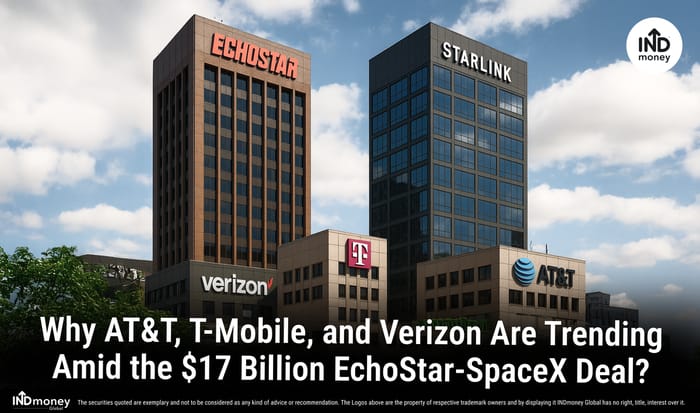
- What’s the EchoStar-SpaceX Deal All About?
- Why Does This Deal Put AT&T, T-Mobile & Verizon in the Spotlight?
- What Does This Means for Each of the Big Three?
- A New Era of the U.S. Mobile Competition
The U.S. telecom sector just witnessed one of its most dramatic shake-ups in years. A $17 billion deal between Elon Musk’s SpaceX and EchoStar has suddenly redrawn the competitive map, rattling America’s “Big Three” carriers and sparking investor buzz across Wall Street. While SpaceX has long been known for Starlink satellite broadband, this deal pushes it firmly into the mobile telecom arena and the reaction has been swift.
Let’s break down with this stock story how the EchoStar-SpaceX pact is reshaping the wireless landscape, and why AT&T, Verizon, and T-Mobile have suddenly landed in the spotlight.
What’s the EchoStar-SpaceX Deal All About?
- Transaction size: SpaceX acquires spectrum licenses from EchoStar for $17 billion (half cash, half SpaceX stock). It will also pay about $2 billion in interest obligations on EchoStar’s debt.
- Spectrum bands: The deal covers the AWS-4 and H-block frequencies which are known for mobile broadband and satellite direct-to-device services.
- Boost for Starlink: The acquisition turbocharges Starlink’s Direct-to-Cell (D2C) program, which aims to deliver broadband-grade mobile connectivity directly to phones, even in rural or remote zones.
- FCC relief: EchoStar had faced scrutiny for underutilizing spectrum. This sale, along with a $23 billion spectrum deal with AT&T earlier this year, helped it resolve FCC inquiries.
- Consumer impact: EchoStar’s Boost Mobile customers will gain direct access to Starlink’s upcoming D2C service, giving them satellite coverage as part of mainstream mobile plans.
- Strategic repositioning: With both AT&T and SpaceX taking slices of its spectrum, EchoStar shifts from a pressured spectrum hoarder to a strategic partner with long-term relevance.
Why Does This Deal Put AT&T, T-Mobile & Verizon in the Spotlight?
The announcement didn’t just move EchoStar and SpaceX, it sent ripples through the entire wireless industry.
- Stock market reaction
- EchoStar’s stock soared 20%+ after the deal as per Google Finance.
- AT&T, Verizon, and T-Mobile fell 3-5% as per Google Finance, reflecting fears of rising competition.
- Business model disruption
- Starlink now owns spectrum that allows it to bypass traditional carrier towers and reach phones directly.
- This threatens the core advantage of carriers, who have relied on massive terrestrial networks as their moat.
- T-Mobile’s relative edge
- Already has an early partnership with SpaceX for satellite-to-phone.
- Could integrate these upgrades faster than rivals.
- Regulatory green light
- The FCC closed its probe into EchoStar’s spectrum obligations, giving both AT&T and SpaceX clear ground to advance.
- Analysts now expect further deals, mergers, and new partnerships in the satellite-mobile space.
- Investor sentiment
- Wall Street sees the deal as a structural industry shift.
- Expectations are for new price wars, faster rural expansion, and tech leaps as competition intensifies.
What Does This Means for Each of the Big Three?
AT&T
- Risk: Starlink’s independent D2C service may eat into AT&T’s rural and enterprise customers.
- Cushion: AT&T’s own $23B spectrum purchase strengthens its 5G expansion, plus analyst confidence remains steady with dividend and buyback support.
T-Mobile
- Strength: Its existing collaboration with SpaceX means it can keep satellites as a differentiator, potentially defending its lead in subscriber growth.
Verizon
- Challenge: Needs to accelerate upgrades and leverage its partnership with AST SpaceMobile to keep up with satellite coverage expansion.
A New Era of the U.S. Mobile Competition
The $17 billion EchoStar-SpaceX pact is more than a spectrum swap, it’s a turning point in how Americans may connect to the internet. For the first time, a satellite operator is positioned as a direct competitor to traditional wireless carriers.
AT&T, T-Mobile, and Verizon are trending not only because their stocks slipped, but because the very model they’ve built for decades; exclusive spectrum plus nationwide towers, is being tested by a company that can beam service from orbit.
For consumers, the upside could be fewer dead zones, more choices, and innovative pricing models. For carriers, the challenge is clear: adapt quickly or risk losing relevance as SpaceX rewrites the rules of connectivity.
Disclaimer:
The content is meant for education and general information purposes only. Investments in the securities market are subject to market risks, read all the related documents carefully before investing. Past performance is not indicative of future returns. The securities quoted are exemplary and are not a recommendation. This in no way is to be construed as financial advice or a recommendation to invest in any specific stock or financial instrument.The figures mentioned in this article are indicative and for general informational purposes only. Readers are encouraged to verify the exact numbers and financial data from official sources such as company filings, earnings reports, and financial news platforms. The Company strongly encourages its users/viewers to conduct their own research, and consult with a registered financial advisor before making any investment decisions. All disputes in relation to the content would not have access to an exchange investor redressal forum or arbitration mechanism. Registered office address: Office No. 507, 5th Floor, Pragya II, Block 15-C1, Zone-1, Road No. 11, Processing Area, GIFT SEZ, GIFT City, Gandhinagar – 382355. IFSCA Broker-Dealer Registration No. IFSC/BD/2023-24/0016, IFSCA DP Reg No: IFSC/DP/2023-24/010.